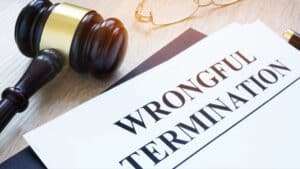
Sarah: These are challenging questions, and I appreciate your concerns.
When a Defendant files for Bankruptcy
A bankruptcy filing by either party in a civil case can have serious adverse consequences for the litigation. If you sued your employer and the Defendant company then filed for bankruptcy, your civil case would be automatically “stayed” (or stopped). While it is possible to obtain special permission from the bankruptcy court to proceed with a civil lawsuit, if a civil case is permitted to go forward and a judgment is obtained, the winner of that judgment will become one of potentially many creditors in the defendant company’s bankruptcy case.
As a creditor in your company’s bankruptcy, it can be difficult (costly and time consuming) to recover any of the funds that may be awarded to you in your civil case. You also may need to hire a bankruptcy attorney to help you navigate the challenging issues that often arise.
Depending on what bankruptcy chapter your employer files under, the company may be able to “discharge” (or entirely avoid paying) certain debts that they owe. Another bad outcome: your company may not have enough assets available to pay its creditors in full. When this happens, creditors often end up receiving pennies on the dollar (if anything) after years of waiting in line as a creditor in the bankruptcy.
Because of the significant risks posed by a Defendant’s bankruptcy, most attorneys complete a thorough investigation into a company’s financial condition before filing a lawsuit. Unfortunately, notice that a Defendant company has filed for bankruptcy can often mean that a future financial recovery will not be possible.
When a Plaintiff Files for Bankruptcy
If a Plaintiff files for bankruptcy, that also can create significant problem in a civil case. Many of our clients come to us in dire financial situations: they either have been recently fired or seriously injured and often have fallen deeply into debt.
Bankruptcy certainly has a dramatic impact on an individual’s credit history. For a civil case, filing for bankruptcy can also have a dramatic impact an individual’s ability to recover any money obtained either through settlement or a jury verdict.
Again, the rules differ depending on the type of bankruptcy involved. In general, however, when a person files for bankruptcy, his or her assets become a part of a bankruptcy “estate” managed by a trustee.
In the administration of a bankruptcy, assets typically will be distributed among an individual’s various creditors. What this means for your civil case: even if a judge or jury found your employer liable and awarded you money damages, your award may become an asset of your bankruptcy estate to be distributed by the trustee to your creditors. Ultimately, at the end of a long bankruptcy proceeding, you may not recover anything.
I have seen clients try to avoid this result by not disclosing their civil case in their bankruptcy filing. This most certainly is a bad idea and also can have dire consequences. When a person files for bankruptcy, they are required to provide the bankruptcy court with a list of all of their assets. This includes any pending lawsuits or even potential legal disputes.
While a failure to disclose a potential legal claim may be inadvertent, we have seen clients come to us having been accused of fraud or misrepresentation. In these situations, we have seen clients who have been prohibited from discharging any of their debts (which was the reason they filed for bankruptcy in the first place).
Navigating the intersection between a civil case and a bankruptcy can be complicated, costly and time consuming. If you find yourself at this difficult crossroads, be sure to consult with an attorney so your next step will be your best step forward.










